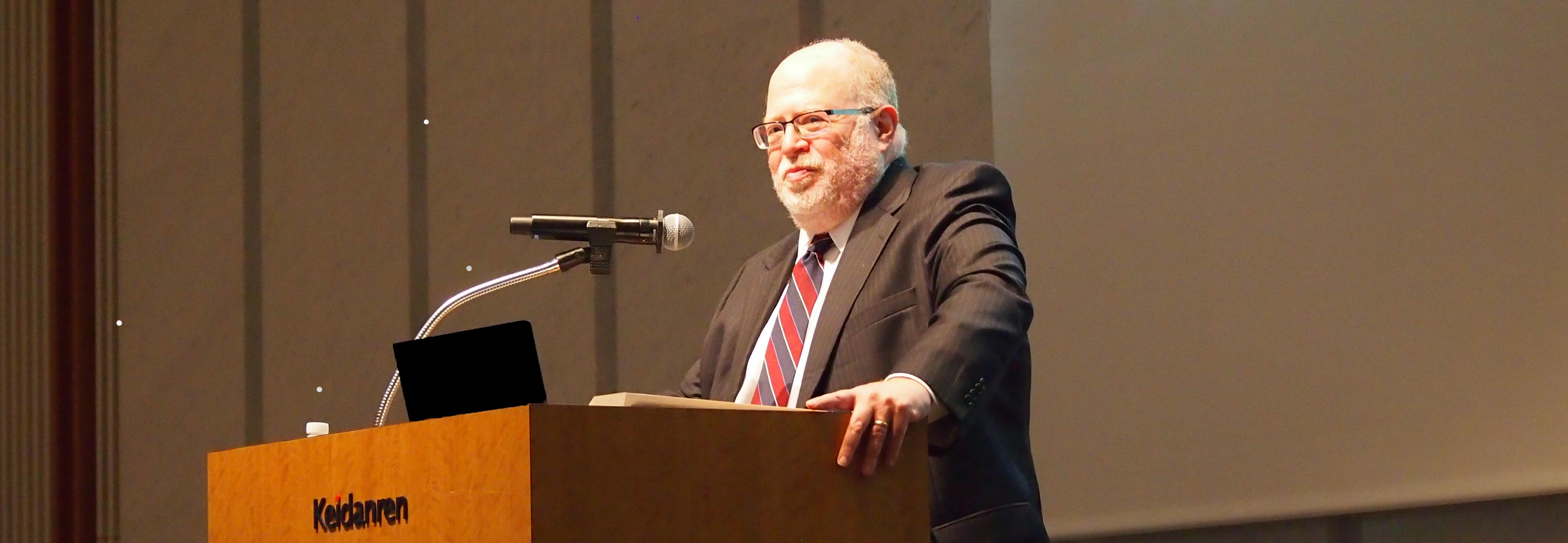
Symposium Economic Challenges in a Changing World
May 10, 2023
Tokyo
Keidanren and Keizai Koho Center held a symposium titled “Economic Challenges in a Changing World” in cooperation with the Peterson Institute for International Economics (PIIE). With Russia’s invasion of Ukraine and the confrontation between China and the US, the global situation remains uncertain. The resulting structural changes in the resource market and surge of food prices are causing enormous impact to business activities and consumers’ livelihoods. Based upon the geopolitical situation, governments around the world are strengthening regulations on export and investment in an effort to fix overdependency on certain countries and build resilience in their supply chains. Under these circumstances, the objective of the seminar was to obtain various suggestions for future corporate activities.
Ms. Yulia Toyokawa, Chair of the Subcommittee on US Relations of the Committee on US Affairs, welcomed the guest speakers from PIIE in her opening remarks.
Dr. Adam Posen, President of PIIE, gave the keynote speech titled “Macroeconomic Outlook for the US and Major Global Economies,” in which he shared an optimistic outlook for the global economies. He stated that the US is seeing little signs of economic slowdown as well as high levels of household savings and labor force participation. However, while inflation in the US currently remains on a stable level, he warned that there is a high potential for inflation to increase while the Federal Reserve has not sufficiently raised interest rates. Therefore, the positive macroeconomic growth may come with high inflation and interest rates.
Dr. Posen also stated that China’s recovery is comparatively slow due to the negative impact of the Zero-COVID policy on consumption behavior and investment as well as the continually increasing share of investment in public enterprises versus private enterprises. He also assessed that Europe recovered strongly from the pandemic’s impact and avoided a recession despite the Russian invasion of Ukraine and rising energy prices. Regarding Sino-US relations, Dr. Posen stated that Japan has room to take the lead not just in bridging between the US and China, but in working with third countries on finding possibilities of constructive economic integration and trade by acting as a “centrist weight” preventing the relationships going too far one way or the other.
The keynote speech was followed by a panel discussion on “Rebuilding Resilient and Sustainable Supply Chains.” Panelists included Dr. Mary Lovely, Senior Fellow of PIIE, Dr. Cullen S. Hendrix, Senior Fellow of PIIE, and Mr. Long Ke, Senior Fellow of the Tokyo Foundation for Policy Research.
Dr. Lovely explained the historical trajectory of supply chains, driven by such factors as changes in the relative costs of manufacturing. She pointed out the high relative increase in the global export share of low-middle income Asian countries (LMIA) in high-tech goods as well as labor- and resource-intensive manufactures such as textile. Dr. Lovely then noted that changes in trade policy and the search for resilience amid geopolitical tensions also influence supply chains, with the key drivers of global value chains currently turning to policy and government as opposed to the invisible hand of the market. Many countries are moving toward a protectionist direction and seek to de-risk supply chains. She characterized the US rhetoric and policy shift towards decoupling from China as a challenge to the multilateral trading regime because of the resulting uncertainty arising in the international economy and investment planning. She emphasized Japan’s important role of using its influence in creating a platform for peaceful coevolution.
Mr. Ke illustrated that the Chinese macroeconomic development has slowed down in the past ten years due to postponed economic reforms, population decrease, the difficulties of the private sector to invest, and the zero-COVID policy’s negative impact on the Chinese economic development. Regarding supply chains, Mr. Ke noted that is impossible for the US, Japan, and Europe to completely decouple from China and instead stressed the importance of rebuilding the relationship and shared values between the countries.
Dr. Hendrix commented on challenges related to critical minerals supply chains, which are key to building out renewable energy infrastructure and EVs. As these supply chains are currently dominated by China, he noted that the advanced economies, including Japan and the US, cannot re-shore their way to resilience by themselves. Therefore, building resilience will not equal a “de-Chinafication” of critical minerals supply chains. Rather, the goal should be to send predictable demand signals to producers and adequately invest in new mining and processing capacity. Furthermore, he recommended catalyzing further downstream investment and development of supply chains in third countries and regions such as Southeast Asia and Sub-Saharan Africa. He also stressed the importance of building new cooperative frameworks.
The consecutive discussion was moderated by Dr. Shunpei Takemori, Senior Fellow of the Research Institute for Economy, Trade, and Industry (RIETI).
